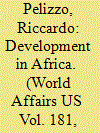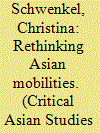| Srl | Item |
| 1 |
ID:
163920


|
|
|
|
|
| Summary/Abstract |
The purpose of this article is to analyze Africa’s progress along the developmental path in the past few decades, to understand what factors were responsible for such success and to identify the risk factors that may compromise further development in the region in the years to come. We advance three basic claims: that Africa has experienced an almost unprecedented (by its standards) level of economic success in the first 15 years of the new millennium, that this success was made possible by a combination of domestic and supranational conditions, and that some of the enabling conditions that supported Africa’s growth and development in the new millennium may be disappearing. The study also suggests that while African countries may not be able to influence the global conditions on which their economic success depends, they do have the ability to influence the domestic conditions. This is why, we suggest, in addition to ensuring longer and healthier lives for their citizens, African countries should consolidate democracy and promote good governance.
|
|
|
|
|
|
|
|
|
|
|
|
|
|
|
|
| 2 |
ID:
133840


|
|
|
|
|
| Publication |
2014.
|
| Summary/Abstract |
The current international order, especially regionally speaking is chaotic, with the following four main features:
First, the great game between the US and China is the key driver behind contemporary change to the international order. Both China and the US are big powers with global influence : One is the biggest power trying to maintain the status quo while the other is the biggest emerging power- according to world bank's latest report of April 30, 2014, China is predicted to becomes the world's largest economic entity in 2014 on the basis of purchasing power parity (PPP).
|
|
|
|
|
|
|
|
|
|
|
|
|
|
|
|
| 3 |
ID:
134043


|
|
|
|
|
| Publication |
2014.
|
| Summary/Abstract |
Vietnam's economic reforms have generated much praise for the country's rapid "opening" of its markets, as if the Vietnamese nation had previously existed in a state of isolation, closed to broader global influences and exchanges. Such discourses overlook the importance of transnational circulations of people, goods, technologies, and expertise during the socialist era that were vital to Vietnam's postwar national reconstruction and continue to play a role in post-socialist economic transformation today. This article traces the socialist pathways of labor migration between Vietnam and the former Soviet Bloc (specifically, East Germany) in the 1980s, mobilities that are generally absent in studies of contemporary export labor industries. Based on multi-sited ethnographic and archival research, the author follows Vietnamese workers first to the East German factories where they labored as "contract workers," and then through their subsequent return and reintegration into Vietnamese society after the collapse of the Soviet Union. These mobilities bespeak of an alternative history and formation of diasporic communities that are little acknowledged or addressed in literature on labor migrations, and yet are important to understanding emerging forms of stratification today in Vietnam. Moreover, an analysis of early non-capitalist experiences with overseas labor regimes in the 1980s provides insights into contemporary Vietnamese governance practices that promote-rather uncritically, similar to other "emerging countries" -export labor as a nation-building strategy to reduce endemic poverty and develop a late socialist country.
|
|
|
|
|
|
|
|
|
|
|
|
|
|
|
|